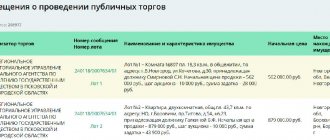An application to resume proceedings in a case can be filed by any participant in the process if the conditions and reasons on the basis of which the court or investigative body decided to suspend the proceedings in the case no longer exist. Files in .DOC: Application form for the resumption of proceedings in the case Sample application for the resumption of proceedings in the case
Grounds for renewing a completed individual entrepreneur
Initiation of completed proceedings against the debtor is possible at the initiative of the parties, if the factors for suspending the case have disappeared and have been cancelled. The right to start a retrial belongs to the bailiff or the collector. The grounds include:
- Changes in circumstances that caused the termination of the process.
- Cancellation of the writ of execution or court order that serves as the basis for completion.
- Submission of an application by the claimant, a representative of the FSSP.
- Obtaining a refusal of a claim for the release of property under arrest.
- The debtor regained its solvency.
- Expiration of the deferment period for fulfilling obligations proposed by the court.
- The defendant, previously put on the wanted list and missing in action, has been found.
Additional commentary on Article 219 of the Code of Civil Procedure of the Russian Federation
The commented article 219 of the Code of Civil Procedure of the Russian Federation regulates the procedure for resuming suspended proceedings in a case. During the period of suspension, the judge has no right to conduct procedural actions, schedule a court hearing, etc. From the day the proceedings are resumed, the time limits for consideration and resolution of the case established by Art. 154 of the Code of Civil Procedure of the Russian Federation, and procedural actions may also be carried out.
On the resumption of proceedings in the case, the court issues a ruling, which indicates the circumstances indicating that the grounds for suspending the proceedings in the case have ceased, as well as the time and place of the court hearing, of which the persons participating in the case and other participants in the process are notified.
The period of suspension of proceedings does not reduce the reasonable time for consideration of the case, the violation of which provides the right to compensation in accordance with Chapter. 22.1 Code of Civil Procedure of the Russian Federation.
Rules for drawing up an appeal
The document is addressed to the body that suspended the case. It is sent to the court or to an FSSP officer. The application must be accompanied by certificates confirming the existence of grounds on which the case can be reinstated.
The form is not strictly defined and must be filled out by hand or on a computer. The language of presentation is formal; colloquial and slang expressions are not allowed. References to regulations are optional, but desirable (you can indicate articles of the law on enforcement proceedings).
You need to know this: Grounds for termination of enforcement proceedings. Art. 43 of the Federal Law of October 2, 2007 N 229-FZ (as amended on June 8, 2020)
The concept of leaving a case without consideration
According to the civil law legislation in force in the Russian Federation, leaving an appeal without consideration is one of the possible forms of completing judicial proceedings, in which the dispute between the parties is not considered on the merits and a decision is not made.
See also in this article how to behave correctly in court.
The fact that the case was left without consideration in no way affects the right of the plaintiff (applicant) to re-apply to the court to file a similar application to the first.
A sufficient argument is the statement that these shortcomings have been eliminated.
Read here what is needed to appeal a court decision.
The only basis for refusal in such cases is violation of certain procedural conditions.
The rules governing these issues are contained in Chapter 19 of the Civil Procedure Code of the Russian Federation (Articles 222–223), as well as in Art. Art. 148–149 of the Arbitration Procedure Code of the Russian Federation.
Filling example
Sample statements after suspension and termination are slightly different. General – indication of the details of the plaintiff, defendant, court or bailiff (with the address of the department).
Hotline for citizen consultations: 8-804-333-70-30
Document after the suspension of the individual entrepreneur
The grounds for temporarily lifting restrictive measures are:
- Recognition of the debtor as missing (the case is resumed if the search is successful).
- Recognition as incompetent (it is possible to conduct a re-examination with different results).
- Participation of the defendant in hostilities on the side of the Russian Federation.
- Revocation of the bank's license.
- Beginning of the bankruptcy procedure (the individual entrepreneur is resumed if the person restores solvency, the insolvency was recognized as fictitious).
- A court decision to defer or installment payments (after its cancellation).
- The defendant is undergoing treatment in a hospital (the process begins after discharge).
Reasons for stopping legal proceedings
The grounds for making such a determination in a civil case are listed in Art. 222 of the Civil Code of the Russian Federation and are divided into 3 types:
- evidence of violation on the part of the plaintiff or applicant in the formation or presentation of an inappropriate claim;
- missing a hearing on a second summons to court without a valid reason;
- the impossibility of this process due to the direct prohibition of current legislation.
First view
The plaintiff does not comply with the procedure for pre-trial dispute resolution; the clauses of the relevant agreement between the parties have been violated.
During the court hearing , some facts may be discovered that indicate errors in accepting the application (Article 152 of the Civil Code) :
- the person who applied is deprived of legal capacity;
- the signatory does not have the authority to sign (submit) the statement of claim;
- an identical application (same subject of dispute and grounds) was previously created and a court (same, different or arbitration) has already initiated a case;
- a conciliation agreement on transferring the proceedings to an arbitration court. The defendant is obliged to provide an objection to the resolution of the dispute through judicial proceedings. Submission of this document is allowed until the consideration of the case on the merits.
Second type
The parties miss the meeting without good reason after being called again.
See here what to do if one of the defendants dies.
No requests have been made to resolve the case in the absence of the parties.
In paragraphs 6–7 of Art. 222 of the Civil Code states that if a valid reason for absence is not presented, a request to consider the case without the presence of its participants, it is assumed that the plaintiff or the parties to the dispute have lost interest and continuation of the process is inappropriate .
However, the court must have reliable information about the service of the subpoena.
If evidence that the parties are absent is included in the case, the claim cannot be left without consideration.
Circumstances of the third type are regulated by Part 3 of Art. 263 Civil Code. If a dispute arises about the right of jurisdiction, the judge is obliged to give an explanation about the possibility of filing a claim on a general basis.
Applications
You will need to add documents to the application that serve as the basis for starting forced debt collection. These include:
- Writ of execution in civil proceedings.
- Confirmation of the defendant's discharge from an inpatient medical facility.
- The court's decision recognizing the bankruptcy procedure as fictitious.
- Bank account statements and other evidence confirming the existence of assets of the debtor.
- Bailiff's resolution on successful search for property.
- Expert conclusion declaring a person sane.
Features of simplified proceedings in administrative cases
The recently released Resolution of the Plenum of the Supreme Court of the Russian Federation No. 42 addresses many controversial issues of simplified proceedings in administrative cases. In what cases can a case be considered in a simplified manner, is it possible to appeal the decision and what responsibilities do the participants in the case have? - said expert lawyer “What to do Consult” Alexander Novikov.
The consideration of administrative cases in the simplified (written) procedure is provided for by Chapter 33 of the Code of Administrative Proceedings of the Russian Federation dated 03/08/2015 No. 21-FZ (as amended on 12/08/2020) {ConsultantPlus}.
In practice, when considering cases in a simplified manner, difficulties may arise related to the application of the norms of the Code of Administrative Proceedings due to insufficient settlement. Some controversial issues of simplified proceedings in administrative cases were resolved in the Resolution of the Plenum of the Supreme Court of the Russian Federation dated December 17, 2020 No. 42 “On the application of the norms of the Code of Administrative Procedure of the Russian Federation when considering administrative cases in simplified (written) proceedings” {ConsultantPlus} (hereinafter referred to as the Resolution ).
What is simplified manufacturing?
Simplified (written) proceedings are a special procedure for considering administrative cases without holding a court hearing and maintaining a protocol, while observing the procedural guarantees established by law for the rights and interests of persons participating in the case, which, unlike writ proceedings, presupposes the existence of a dispute[1].
Cases in which an administrative case can be considered through summary proceedings are regulated by Article 291 of the Code of Administrative Proceedings of the Russian Federation dated 03/08/2015 No. 21-FZ (as amended on 12/08/2020) {ConsultantPlus}. The Plenum of the Supreme Court of the Russian Federation, in paragraph 2 of its Resolution, systematized all these cases.
When can a case be considered under summary proceedings?
Taking into account the clarifications given by the Supreme Court, an administrative case may be considered by the court of first instance through summary proceedings if one of the following conditions is present:
- all persons participating in the case have filed petitions to consider the administrative case in their absence, and their participation in the consideration of this category of administrative cases is not mandatory;
- a petition for consideration of an administrative case in a simplified (written) procedure was filed by the administrative plaintiff, and the administrative defendant does not object to the application of such a procedure for consideration of the administrative case;
- the total amount of debt for mandatory payments and sanctions indicated in the administrative statement of claim does not exceed twenty thousand rubles (in particular, administrative cases on the collection of mandatory payments and sanctions in an amount not exceeding twenty thousand rubles are subject to consideration in the simplified (written) procedure, in the event if the acceptance of an application for a court order based on these requirements is refused or the court order is canceled) (Part 1 of Article 291 of the CAS RF);
- all persons participating in the case, duly notified of the time and place of its consideration, whose appearance is not mandatory or not recognized by the court as mandatory, or representatives of these persons did not appear at the court hearing (part 7 of article 150 of the CAS RF);
- a demand was declared from the territorial body of the federal executive body to ensure the established procedure for the activities of courts and the execution of judicial acts and acts of other bodies on the collection of costs for the drive (Part 1 of Article 120 of the CAS RF);
- when considering a case challenging a normative legal act, there are grounds provided for in Part 5 of Article 216 of the CAS RF.
In addition to the above situations, cases of challenging regulatory legal acts can also be considered through simplified proceedings. Explanations on the category of normative legal acts that can be considered under simplified proceedings are given in paragraph 41 of the Resolution of the Plenum of the Supreme Court of the Russian Federation dated December 25, 2018 No. 50 “On the practice of courts considering cases challenging normative legal acts and acts containing clarifications of legislation and having normative properties" {ConsultantPlus}.
Thus, by way of simplified proceedings, claims to challenge regulatory legal acts that have less legal force and reproduce the content of a regulatory legal act recognized by the court as not being valid in whole or in part, or are based on it and follow from it, can be considered.
In addition, the same procedure may be used to consider demands to challenge a normative legal act re-adopted in order to overcome a court decision declaring the normative legal act invalid in whole or in part, or demands to challenge the provisions of a normative legal act containing legal regulation identical in meaning to that previously declared ineffective[2].
Administrative cases specified in Chapters 24 - 31.1 of the CAS of the Russian Federation (Part 2 of Article 291 of the CAS of the Russian Federation) are not subject to consideration under simplified (written) proceedings. Also, according to the rules of simplified (written) proceedings, administrative cases cannot be considered in the appellate and cassation instances (paragraph 3, paragraph 1 of the Resolution).
Rights and obligations of participants in a case considered in the proceedings
If there are grounds for considering an administrative case in a simplified manner, the court issues a ruling. The court ruling must contain information about the existence of grounds that make it possible to apply the rules of simplified proceedings in the administrative case under consideration, as well as an explanation that objections to the application of the simplified procedure procedure must be submitted to the court within ten days from the date of receipt of a copy of the ruling[3]. The ruling must be sent to the persons participating in the consideration of the case no later than the next day after the day the ruling was issued[4].
The administrative defendant’s refusal to receive a copy of the ruling or failure to receive it due to circumstances beyond his control does not prevent the consideration of the administrative case through simplified (written) proceedings (paragraph 5 of clause 4 of the Resolution).
In a situation where all participants in the case who were duly notified of its consideration did not appear for the consideration of an administrative case in a simplified procedure (there is evidence of proper notification), and their appearance is not mandatory or is not recognized by the court as mandatory, including representatives of such persons, the case can be considered in a simplified manner if all the conditions specified below are met[5]:
- the administrative case under consideration does not belong to the categories of cases that are not subject to consideration in the simplified (written) procedure (Part 2 of Article 291 of the CAS RF);
- there are no requests to postpone the trial, supported by evidence indicating the presence of valid reasons for failure to appear at the court hearing.
In addition to the rights and obligations provided for in Article 45 of the CAS of the Russian Federation, participants in a case considered in a simplified manner have the right to submit documents in electronic form, including written statements, objections, explanations and evidence[6].
Deadlines for submitting a decision
A decision in an administrative case considered under summary proceedings must be made by the court within a period not exceeding ten days from the date of expiration of the deadlines specified in Part 5.1 of Article 292 of the Code of Administrative Proceedings of the Russian Federation dated 03/08/2015 No. 21-FZ (as amended by 12/08/2020) {ConsultantPlus}, on any day within this period.
In accordance with Part 5.1 of Article 292 of the Code of Administrative Proceedings of the Russian Federation dated 03/08/2015 No. 21-FZ (as amended on 12/08/2020) {ConsultantPlus}, in the ruling on consideration of an administrative case in a simplified procedure, the court sets a deadline for the parties to submit to the court and sending them to each other evidence and objections regarding the claims presented, which must be at least fifteen days from the date of the relevant determination. In the ruling on consideration of an administrative case through summary proceedings, the court also sets a period during which the parties have the right to submit to the court and send to each other additional documents containing explanations on the merits of the stated requirements and objections in support of their position. This period must be at least thirty days from the date of the relevant determination.
The period between the expiration date for the submission of evidence and objections and the expiration date for the submission of other documents must be at least fifteen days.
The simplified procedure for considering a case does not involve calling the parties. In this regard, persons participating in the case are not notified of the time and place of the decision on the case. After a decision is made in an administrative case, no later than the next working day, a copy of the decision is sent to the persons participating in the case[7].
In this case, he has the right to draw up a decision in the form of an electronic document[8].
If there are grounds provided for in paragraphs 4 - 5 of paragraph 2 of Resolution No. 42 of December 17, 2020 “On the application of the norms of the Code of Administrative Proceedings of the Russian Federation when considering administrative cases in simplified (written) proceedings” {ConsultantPlus}, an application for reimbursement of legal expenses incurred in connection with the consideration of an administrative case, filed with the court of first instance after the resolution of the administrative case, may be considered in a simplified manner[9].
Appealing the decision
If, after a decision is made in the simplified procedure, objections are filed with the court from an interested person who considers it unlawful to consider the case in a simplified manner, or new evidence in the case is presented, sent within the period established by law (including evidence containing valid reasons for failure to appear at the court hearing , in which the issue of moving to consideration of the case in the simplified procedure is resolved), the court issues a ruling to cancel the court decision made by it in the summary procedure, and at the same time to resume the consideration of the administrative case according to the general rules of administrative proceedings. Also, circumstances leading to the cancellation of a decision in a case will include an objection from a person who was not involved in the administrative case, but the decision made by the court affects his rights and obligations, provided that such an objection is filed within two months after the decision is made.
If necessary, an application to cancel a decision made through summary proceedings may be considered by summoning the persons participating in the case. Such necessity is determined at the discretion of the court. If there is no such need, the decision may be canceled by a ruling of the relevant court, issued without holding a court hearing and receiving additional explanations (objections) from the persons participating in the case.
The ruling to cancel the decision by the court that adopted it is issued within a period not exceeding ten days from the date of receipt of objections (statements or evidence) to the court. This is stated in paragraph 9 of the Resolution.
Part 1 of Article 202 of the Code of Administrative Procedure of the Russian Federation dated 03/08/2015 No. 21-FZ (as amended on 12/08/2020) {ConsultantPlus} provides for an appeal of court rulings separately from an appeal of a judicial act that ends the consideration of the case, except in cases where the court ruling hinders the further progress of the administrative case. The Plenum of the Supreme Court of the Russian Federation has added to the list of situations when a ruling is appealed together with a judicial act. Paragraph 10 of the Resolution provides that the court's ruling to cancel a decision made by it in a simplified (written) proceeding and to resume consideration of an administrative case or to refuse this is not subject to appeal separately from the appeal of a judicial act that ends the consideration of an administrative case. Thus, on December 17, 2021, the Plenum of the Supreme Court of the Russian Federation, having issued Resolution No. 42, once again attempted to eliminate gaps in the legal regulation of simplified proceedings in administrative cases.
In our opinion, such actions are justified. This is due to the fact that simplified proceedings make it possible to reduce the time from filing an application to the court until a decision is made on the case, thereby optimizing the activities of the courts and the workload directly on judges. The procedure itself is simplified by the fact that the appearance of persons participating in the case is not required, court hearings in the case are not held, and it is possible to send documents and evidence in electronic form, as well as to make a decision in the form of an electronic document.
By eliminating gaps in the regulation of administrative proceedings in simplified cases, the Plenum of the Supreme Court thereby minimizes procedural delays both for the participants in the process and for the courts, which will be able to be guided by the position of the Supreme Court, rather than formulate their own conclusions. Moreover, deviation from the principle of uniformity in the interpretation and application of rules of law by courts provides the parties to the case with a reason to appeal it (Article 341 of the Code of Administrative Proceedings of the Russian Federation dated 03/08/2015 No. 21-FZ (as amended on 12/08/2020) {ConsultantPlus}).
[1] Clause 1 of the Resolution of the Plenum of the Supreme Court of the Russian Federation dated December 17, 2020 No. 42 “On the application of the norms of the Code of Administrative Procedure of the Russian Federation when considering administrative cases in simplified (written) proceedings” {ConsultantPlus}
[2] Part 2, and 5 art. 216, paragraph 4 of Art. 291 CAS RF.
[3] Clause 4 of the Resolution.
[4] Art. 201 of the Code of Administrative Proceedings of the Russian Federation dated 03/08/2015 No. 21-FZ (as amended on 12/08/2020) {ConsultantPlus}.
[5] Clause 6 of the Resolution.
[6] Clause 3 of the Resolution.
[7] Part 6 art. 292 of the Code of Administrative Proceedings of the Russian Federation dated 03/08/2015 No. 21-FZ (as amended on 12/08/2020) {ConsultantPlus}, part 2 of Art. 293 art. 293 of the Code of Administrative Proceedings of the Russian Federation" dated 03/08/2015 No. 21-FZ (as amended on 12/08/2020) {ConsultantPlus}.
[8] Clause 14 of the Resolution.
[9] Para. 3 clause 14 of the Resolution.
Timing for resumption of production
The procedure according to which an application to reopen a case left without consideration is submitted is determined by Art. Art. 331 and 223 Civil Procedure Code and Art. 148 Arbitration Procedure Code.
These requests are considered in accordance with the general procedure.
According to Article 203 of the Code of Civil Procedure, the concept of “leaving a claim without consideration” means the cancellation of a break in the period specified by law.
The interested parties thus return to the pre-procedural state.
The end of the process on the points listed in Article 96 of the Code of Civil Procedure presupposes the return to the applicant, at his request, of the state duty he paid at the expense of budgetary funds.
Termination of judicial proceedings can be appealed to a higher court (Article 371 of the Civil Code of the Russian Federation). As a sufficient reason, the deprivation of a participant in the process of the opportunity for its further development is indicated.
The procedural period for a petition to the court of first instance to cancel a ruling containing an indication of the fact that the claim has been left without consideration is not limited.
Application for reopening a case left without consideration
An application to reopen a case left without consideration is drawn up in accordance with the general requirements for the procedure for preparing documents in court.
Mandatory items are : full indication of the name of the judicial authority, as well as full name, address, contact telephone number and e-mail (if available) of the applicant himself and his position in the case.
The following are listed : the date of the ruling, the names of the parties and the essence of the claims, the essence of the ruling issued by the court and an explanation of the valid reason for non-compliance with the requirements that were an obstacle to the successful completion of the process.
The petition must indicate the reasons why the process was left without consideration.
Further, based on Art. 223 of the Civil Code of the Russian Federation, the applicant submits a request to cancel the judge’s ruling.
See in this article how to correctly draft an appeal against the reversal of a decision of the first instance court.
The list of documentary evidence attached to the application must be indicated at the end.
Documents are attached to the application (with the number of copies for each sheet in accordance with the number of participants in the trial).
So, based on procedural law, there are legitimate opportunities to leave the case without consideration.
The defendant has the right to file a petition in connection with the plaintiff’s violation of the pre-trial procedure for resolving the dispute.
The judge himself may also act as an initiator, for example, due to the plaintiff’s absence from two consecutive hearings.
In case of disagreement, there is the right to refer to Article 223 of the Code of Civil Procedure of the Russian Federation and demand the cancellation of the determination.
It is necessary to provide convincing evidence of the impossibility of your arrival in the courtroom and the absence of ways to warn the judge about this in a timely manner.
The plaintiff (applicant) has the right to file an application to reopen a case left without consideration (in accordance with Articles 331 and 223 of the Code of Civil Procedure and Article 148 of the Arbitration Procedure Code).
However, he must first eliminate these shortcomings. These requests are considered in the general manner.
Leaving it without consideration is not the same as refusing the claim or terminating the proceedings . If you apply again in the future, this fact will most likely not in any way affect the course of the process itself.
Reinstatement of the case
Resumption of consideration of a case left without consideration is possible subject to the full elimination of the circumstances listed as impeding the proceedings.
According to Art. 222 of the Code of Civil Procedure, the requirements and the procedure for achieving them must be contained in the text of the definition.
The plaintiff, who has eliminated the shortcomings, applies again in accordance with the general procedure..
The process is resumed after the defendant’s petition, if evidence is provided that the reason for missing the hearing is valid and that the reason for missing the meeting is not possible and the judge is unable to report it in a timely manner.
A legitimate response to a refusal to grant a request would be to file a private complaint. The rules of procedure are prescribed in Part 3 of Article 222 of the Civil Procedure Code.






